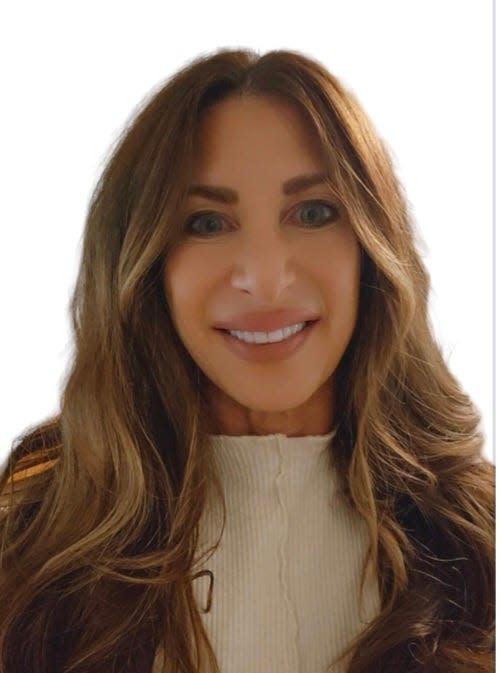Fired at 50, she felt like she'd lost everything. Then came the grief.
This is the third story in a series exploring grief, how people face it, cope with it and heal from it.
Click here to read the first installment: This family went through an unimaginable tragedy. How YouTube helped. And here for the second: At 25 she found out she had the breast cancer gene. Now, she's grieving motherhood.
Lisa Bowman had everything going for her − until she didn't.
The now 56-year-old was the global chief marketing officer for United Way. United Way, an education, economic mobility and health-focused nonprofit, recruited her.
What should've been a dream job spiraled into a nightmare: she alleged she was sexually harassed at work, and more than 20 former employees of the company said "sexual harassment, discrimination and retaliation is commonplace," at the company, according to a 2021 HuffPost report. The nonprofit fired Bowman in January 2020, months after she reported the harassment. Multiple claims have been filed with the Equal Employment Opportunity Commission; United Way told USA TODAY it doesn't comment on matters of employment. The CEO of United Way resigned as the chaos swirled.
But Bowman didn't just lose her job. She lost much more.
"The loss of my job was really that loss of my identity," she says. "All of a sudden, I went from being Lisa Bowman, CMO of the world's largest nonprofit where anybody would take my call, people were beating down the door to talk to me, to all of a sudden just being Lisa Bowman, private citizen, with no identity, so to speak. And that was a really, really tough thing for me to navigate."
Grief doesn't apply to death alone. It comes in a series of shapes and sizes different than you might expect. And all can coexist.
(You can share yours with us at the bottom of this article).
"There's room enough in the world for all these losses, and one doesn't take away from the other," says David Kessler, grief expert and founder of Grief.com.

'We identify very closely with our role'
Bowman says her grief affected her as a woman: "When I talk about the grief over the loss of a job, I think for women, as we fight so hard sometimes to get to executive levels, and those C-suite positions, when we get there, that job becomes an integral part of our identity," she says. "And so we identify very closely with our role."
She attempted to push through her grief – a "fake it 'til you make it" mentality – the same way she dealt with it at 26 following the death of her mother.
"She never got to see certain things happen in my life. She wasn't there for a wedding, for example, or to see the career trajectory that I ended up with, which have largely been influenced by her," Bowman says. "And in some cases, this is kind of the same thing. I'm missing out on all of those things because of this loss of a job. And that in and of itself – it's grief. Every time something happens, and I have a financial challenge, it brings it all back."
Bowman confided in friends and family in lieu of professional help. While none could relate to her quandary, they listened to her. Heard her cry.
She later poured those thoughts into a book – "Harasshole" – which, while therapeutic, made it that much harder for her to get a job. Bowman previously had a 15-year stint in executive-level marketing roles at UPS but now freelances.
"It's made it very, very difficult for me to find employment," she says. "I have candidly applied for over 1,000 jobs. I've had people tell me that they would love to hire me and they can't because they can't take a risk with me. I've had job offers rescinded when people have found out about this."
Another kind of grief: missed opportunities.
What is 'disenfranchised grief'?
Bowman's grief is not more or less than any other type of grief. "There's a context to think about it, as sometimes we approach grief like it's a pie," Kessler says. "And it goes wrong if we think, Wait, wait, you're taking some of the pie on your job loss. But I need a lot of it because my spouse died. And that isn't how grief works."
Some might call Bowman's job loss "disenfranchised grief" – a loss not openly acknowledged, socially mourned, or publicly supported, according to Loree Johnson, a licensed marriage and family therapist. It's grief felt on an individual level not necessarily seen by others.
Plus, "the emotions can be the same, regarding all kinds of loss," says Amy Morin, psychotherapist and the host of a podcast. "Someone who lost their job may feel sad, anxious, and a bit disoriented, which might be the same feelings someone experiences when they lose a friend or relative."
Read next: At 25 she found out she had the breast cancer gene. Now, she's grieving motherhood.
'The grief doesn't go away'
Today, Bowman's grief hasn't dissipated. It's morphed: "Similar to the loss of a person, the grief doesn't go away. It's just that you get used to carrying it. So it doesn't feel quite as heavy."
For those going through a similar crisis, Bowman offers these words of advice: "You have to realize that it's not your role that defines who you are. It's who you are that makes you you. It's your skills, it's your capabilities, it's the value you provide."
Sad: Her son died, and she felt alone. In her grief, she found YouTube.
This article originally appeared on USA TODAY: What is disenfranchised grief? On losing a job that is your identity
